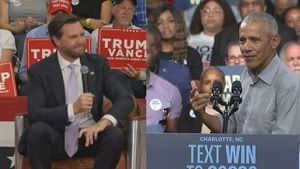As the election draws closer, political fervor escalates, particularly with the major presidential campaigns of the Republican and Democratic parties staging significant rallies in Charlotte. Former President Barack Obama made a notable appearance at the Charlotte Convention Center to support the Harris-Walz campaign, marking his first rally in the city for the year. Obama seized the opportunity to directly criticize Republicans, particularly targeting former President Donald Trump, Lieutenant Governor Mark Robinson, and state superintendent candidate Michelle Morrow. Central to Obama’s speech was a condemnation of the misleading information disseminated by Trump and his vice presidential pick, Senator JD Vance, regarding disaster recovery efforts in western North Carolina.
During his address, Obama expressed deep concern over the exploitation of vulnerable populations during times of crisis. He articulated this point by questioning the morality of politicians who manipulate such sensitive moments for personal gain. “At a moment when people are most vulnerable, most desperate,” he questioned, “when did that become okay?” This kind of rhetoric was meant to galvanize his supporters and encourage them to critically assess the integrity of those vying for political power, regardless of party affiliation. He emphasized that such behavior should not be tolerated, urging voters to consider the ethical implications of the candidates they support.
On the other side of the political spectrum, JD Vance, nominated as the Republican vice president, hosted a Town Hall event in Monroe. His discussion focused on pragmatic issues affecting the daily lives of citizens, such as immigration policy, inflation, and the rising costs of energy, gas, and housing. Vance explained the ripple effects of energy price increases on overall living expenses, particularly highlighting how these surges impact transportation costs and, subsequently, the prices of essential goods like groceries and housing. “When energy goes up everything becomes more expensive,” he stated, establishing a direct connection between energy costs and the financial strain experienced by everyday Americans.
J.D. Vance’s remarks suggest a Republican strategy centered around economic anxieties. By emphasizing the connections between energy prices and general inflation, the campaign seeks to resonate with voters who are feeling the pinch of rising costs. Vance’s narrative frames the Republican party as concerned with practical issues that affect families’ bottom lines, thus positioning them as a more grounded alternative in light of what they perceive as the Democrats’ detachment from these concerns. The juxtaposition of Vance’s grounded economic discourse with Obama’s emotionally charged moral critique illustrates the stark contrasts in campaign strategies between the two parties.
As the political rhetoric intensifies, the implications for voter turnout and engagement remain significant. Democrats are working to energize their base by appealing to a sense of social justice and ethical governance, driven by the legacy of their former president. In contrast, Republicans, through Vance’s focus on tangible economic concerns, aim to attract undecided voters or those disenchanted with the current administration by pledging to address their immediate financial woes.
In summary, the rallies in Charlotte exemplify the broader national narrative as both parties gear up for a consequential election. With influential figures at the forefront, they are deliberately shaping their messaging to appeal to different facets of the electorate. While Obama’s approach leans heavily on morality and the consequences of political integrity, Vance’s focus remains steadfast on practical economic issues, setting the stage for a competitive race ahead. As both parties navigate this critical juncture, the effectiveness of their campaigns could heavily influence voter sentiment and turnout in the upcoming election.

